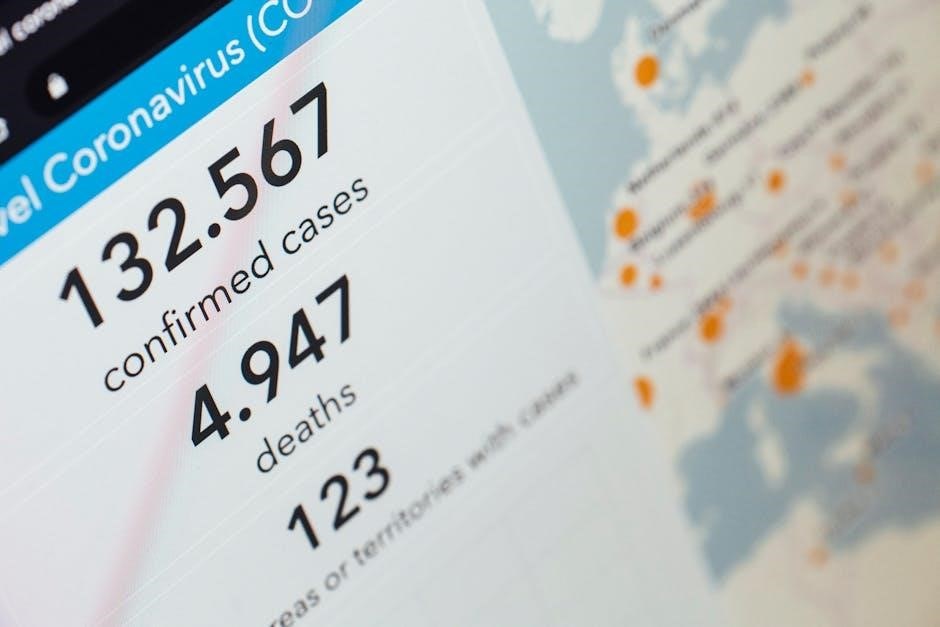Quick Facts for NCLEX provide concise, essential information for exam preparation, covering key content areas like pharmacology and mental health nursing․ Designed to simplify complex topics, these guides are a valuable resource for nursing students, offering easy-to-understand facts and strategies to tackle the NCLEX with confidence․
1․1 Overview of NCLEX Exam Preparation
NCLEX exam preparation requires a strategic approach to master the vast content effectively․ Quick Facts guides simplify complex topics into concise, easy-to-understand formats, focusing on high-yield areas like pharmacology and mental health nursing․ These resources emphasize essential concepts, helping students identify key information quickly․ By breaking down difficult subjects, they enable focused study sessions, ensuring students are well-prepared for the exam․ Additionally, they provide practical strategies for tackling multiple-choice questions and managing time efficiently during the test․ These guides are invaluable for both first-time test-takers and repeat candidates seeking to improve their performance․
1․2 Importance of Quick Facts in NCLEX Study Guides
Quick Facts play a crucial role in NCLEX study guides by providing students with condensed, high-yield information․ These resources are designed to help students grasp key concepts efficiently, making them ideal for last-minute reviews or targeted study sessions․ By highlighting essential facts and eliminating unnecessary details, Quick Facts guides enable students to focus on critical areas, ensuring they are well-prepared for the exam․ Their portability and concise format make them a convenient tool for on-the-go study, reinforcing retention and boosting confidence․ This approach ensures that students can quickly access vital information, aiding in effective exam preparation and strategy development․

Structure and Format of the NCLEX Exam
The NCLEX exam is a computer-adaptive test with a variable number of questions, ranging from 75 to 265, and a maximum time limit of 6 hours․ The exam includes multiple-choice questions, as well as alternate-format items like drag-and-drop and hot-spot questions․ Candidates are provided with a brief tutorial before starting and can take optional breaks․ The adaptive format ensures that the difficulty of questions adjusts based on the test-taker’s responses, accurately assessing their competency level․ Understanding this structure helps candidates prepare effectively and manage their time wisely during the exam․
2․1 Types of Questions and Exam Timing
The NCLEX exam features multiple-choice questions, drag-and-drop, and hot-spot formats, requiring critical thinking and application of nursing knowledge․ The exam duration is up to 6 hours, with candidates answering between 75 and 265 questions․ The adaptive format adjusts question difficulty based on responses․ A pre-exam tutorial is provided, and optional breaks are allowed․ Managing time effectively is crucial, as the exam tests both knowledge and decision-making skills under pressure․ Understanding the question types and timing helps candidates prepare strategically and optimize their performance during the exam․
2․2 Key Content Areas Tested on the NCLEX

The NCLEX exam evaluates a broad range of nursing competencies, with a strong emphasis on pharmacology, mental health, and medical-surgical nursing․ Other key areas include pediatrics, maternal-neonatal care, and fundamentals of nursing practice․ The exam also tests knowledge of health promotion, disease prevention, and infection control․ Additionally, questions address legal and ethical considerations, patient safety, and culturally competent care․ Understanding these content areas is critical for success, as they reflect the skills and knowledge required for safe and effective nursing practice․ Mastery of these topics ensures a solid foundation for the exam and real-world application․

High-Yield Content Areas for NCLEX
Pharmacology, mental health nursing, and medical-surgical nursing are high-yield areas, requiring focused study due to their frequent appearance on the NCLEX exam․
3․1 Pharmacology: Essential Drug Classes and Side Effects
Pharmacology is a critical NCLEX content area, focusing on essential drug classes like cardiovascular, respiratory, and neurological agents․ Understanding their mechanisms, uses, and side effects is vital․ Quick Facts guides highlight key drugs, such as beta-blockers and antipsychotics, emphasizing common side effects like hypotension or extrapyramidal symptoms․ Memorizing these details helps in identifying correct answers, especially in prioritization questions․ Effective study strategies include creating flashcards and reviewing drug interactions to ensure a strong foundation for exam success․
3․2 Mental Health Nursing: Key Concepts and Interventions
Mental health nursing focuses on therapeutic communication, crisis interventions, and patient-centered care․ Quick Facts guides emphasize key concepts like assessing mental status, identifying coping mechanisms, and understanding legal/ethical considerations․ Interventions for disorders such as anxiety, depression, and psychosis are highlighted, including de-escalation techniques and medication management․ These resources also cover patient rights, confidentiality, and cultural sensitivity, ensuring nurses are prepared to address diverse mental health needs effectively during the NCLEX exam․

Test-Taking Strategies for Success
Master time management, read questions carefully, avoid guessing, and prioritize high-weight topics․ Stay calm, use elimination techniques, and focus on high-probability answers to maximize scores․
4․1 How to Approach Multiple-Choice Questions
When tackling multiple-choice questions, start by carefully reading the entire question and identifying key terms․ Eliminate obviously incorrect options first to narrow down choices․ Analyze remaining answers for subtle differences, focusing on common patterns like absolutes or opposites․ Use the process of elimination to increase confidence․ If unsure, make an educated guess based on known facts․ Avoid changing answers unless certain of a mistake․ Practice active reading and critical thinking to improve accuracy and speed․

4․2 Managing Time During the Exam
Efficient time management is crucial during the NCLEX exam․ Allocate 60-75 seconds per question to maintain a steady pace․ Prioritize answering easier questions first to build confidence and save time for challenging ones․ Use the “skip and return” strategy for difficult questions, marking them for review later․ Avoid spending more than 2 minutes on any single question to prevent falling behind․ Take short breaks if needed, but stay focused to complete all questions within the 6-hour timeframe․ Practice time management during study sessions to enhance speed and accuracy․

The Role of Quick Facts Guides in NCLEX Prep
Quick Facts guides provide concise, high-yield information, aiding students in focused study and efficient exam preparation․ They condense complex topics into easy-to-understand content, enhancing learning and retention․
5․1 Benefits of Using Concise Study Materials
Concise study materials like Quick Facts for NCLEX offer numerous benefits, including time efficiency and reduced study stress․ They provide high-yield information in an easy-to-digest format, allowing students to focus on key concepts without overwhelming detail․ By condensing complex topics, these guides enhance retention and facilitate quick reviews, especially during final exam preparation․ Additionally, their portability enables students to study on the go, making them an invaluable resource for busy nursing candidates․ This streamlined approach ensures that students can master essential content efficiently, boosting their confidence and readiness for the NCLEX exam․
5․2 How to Integrate Quick Facts into Your Study Plan
Integrating Quick Facts into your study plan can be done by first identifying your weaker areas, such as pharmacology or mental health, and focusing on those sections․ Allocate specific times each day to review these concise guides, ensuring consistent study sessions․ Use them for last-minute reviews before the exam to quickly refresh key concepts․ Combine Quick Facts with practice questions to apply knowledge effectively․ Utilize the portability of PDF formats for flexible study sessions․ Set specific goals, like mastering certain drug classes weekly, and track progress․ Engage actively by highlighting, note-taking, or creating flashcards․ Consider joining study groups for deeper discussions and balance Quick Facts with other resources for comprehensive preparation․ Use these guides during later study stages as a final review tool and assess progress periodically to identify areas needing more attention․ Stay organized by categorizing PDFs for easy navigation, reducing stress and saving time․ By strategically incorporating Quick Facts, you can enhance your NCLEX preparation and improve success chances․

Popular NCLEX Study Guides
Popular NCLEX study guides like ReMar Quick Facts and Lippincott Fast Facts offer concise, portable study materials covering essential content areas, ideal for last-minute reviews and trusted by nursing students․
6․1 ReMar Quick Facts for NCLEX
ReMar Quick Facts for NCLEX is a trusted study guide designed by Regina Callion, MSN, RN, to help nursing students pass the exam․ Known for its concise outline format, it covers high-yield topics like pharmacology, mental health, and medical-surgical nursing․ The guide is portable, making it easy to review on the go․ Its straightforward approach breaks down complex concepts into digestible facts, focusing on what’s most critical for exam success․ Many students rely on it as a last-minute review tool, praising its clarity and effectiveness in reinforcing key content areas․ Available as a digital download, it’s a popular choice for efficient NCLEX preparation․
6․2 Lippincott Fast Facts for NCLEX-RN
Lippincott Fast Facts for NCLEX-RN is a concise and comprehensive study guide designed to simplify exam preparation․ It covers all aspects of nursing care, with thousands of key facts organized for quick review․ The guide is particularly useful for students needing a focused study tool, offering clear, easy-to-understand content․ Its structured format ensures that critical information is accessible, helping students identify and master high-yield topics․ Available in PDF and other formats, it’s a trusted resource for efficient and effective NCLEX-RN preparation, widely recommended by nursing educators and students alike․

Final Tips for Exam Day
Stay calm, arrive early, and manage your time wisely․ Review key facts quickly, avoid guessing, and focus on high-probability questions to ensure a confident performance․
7․1 Last-Minute Review Strategies

Focus on skimming key notes and high-yield topics like pharmacology and mental health nursing․ Use mnemonics or flashcards for quick recall․ Prioritize areas where you feel least confident, and avoid overloading with new information․ Review the NCLEX format and timing to maintain composure․ Utilize quick fact guides like ReMar or Lippincott for concise, targeted prep․ Stay calm, visualize success, and trust your preparation to tackle the exam with confidence and clarity․
7․2 Staying Calm and Confident
Staying calm and confident on exam day is crucial for optimal performance․ Practice deep breathing exercises to manage anxiety and maintain focus․ Avoid overthinking and trust in your preparation․ Visualize success to boost morale and reduce stress․ Remind yourself of your hard work and readiness․ A positive mindset will help you approach questions with clarity and confidence, ensuring you perform at your best․ Remember, confidence comes from thorough preparation and self-belief․



About the author